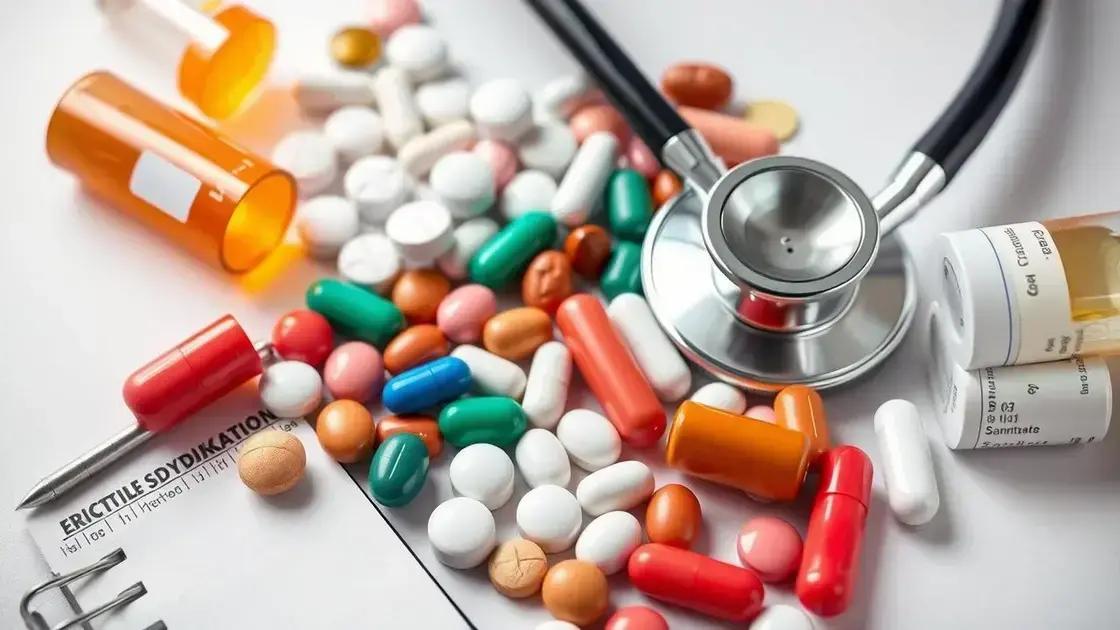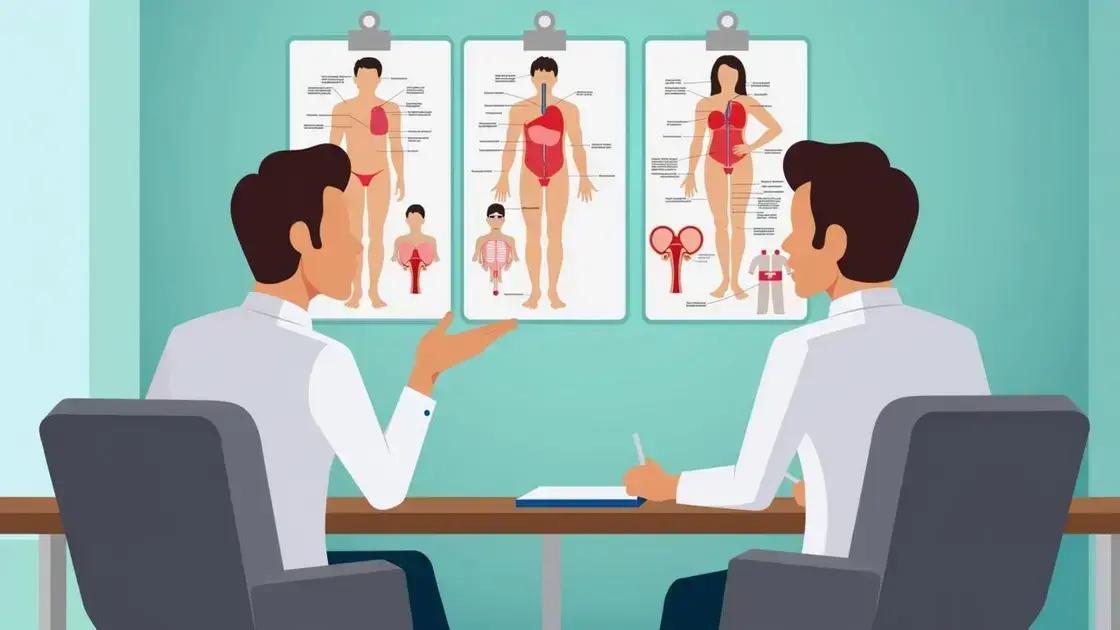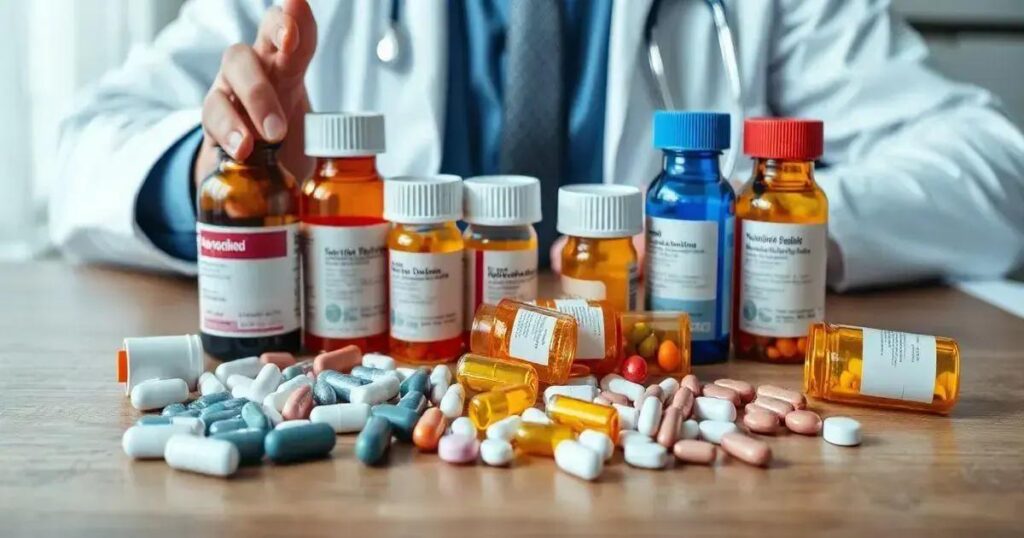Erectile dysfunction medications interact with various treatments, including nitrates and antidepressants, causing safety concerns. It’s crucial to communicate openly with healthcare providers to tailor a safe and effective treatment plan, manage potential side effects, and explore lifestyle changes to improve sexual health.
Understanding how erectile dysfunction medication interacts with other treatments is crucial for those seeking effective solutions. Many individuals rely on these medications, but combining them with other treatments can lead to both positive and negative outcomes. In this article, we will explore how different medications interact, the importance of side effects management, and the best practices for consulting healthcare providers.
Understanding Erectile Dysfunction Medications

Erectile dysfunction medications are primarily designed to improve blood flow to the penis, helping men achieve and maintain an erection. These medications work by inhibiting an enzyme known as phosphodiesterase type 5 (PDE5), which can limit blood flow. Understanding these medications is essential for individuals exploring effective treatment options.
Types of Erectile Dysfunction Medications
Several common medications fall into this category, including:
- Sildenafil (Viagra) – Often the first choice for many men, it typically starts working within 30 to 60 minutes.
- Tadalafil (Cialis) – Known for its longer duration. Effects can last up to 36 hours.
- Vardenafil (Levitra) – Similar to Viagra in terms of onset and duration but may be more effective for certain individuals.
- Avanafil (Stendra) – A newer medication with a quick onset, often taking as little as 15 minutes to work.
How They Work
These medications enhance the natural process of arousal by increasing blood flow. When a man is sexually stimulated, these drugs help relax the muscles in the penis, allowing for increased blood flow.
Dosage and Administration
It’s crucial to follow the prescribed dosage. Most medications are taken as needed before sexual activity. However, Tadalafil can be taken daily, depending on doctor guidelines.
Possible Side Effects
While these medications are generally safe, they may cause side effects in some cases. Common side effects include:
- Headaches
- Flushing
- Indigestion
- Changes in vision
- Nasal congestion
Understanding the potential side effects can lead to informed decisions about your sexual health.
Factors Influencing Effectiveness
Several factors can influence how well erectile dysfunction medications work, including overall health, existing medical conditions, and lifestyle habits such as smoking or excessive alcohol consumption. Consult a healthcare provider for personalized advice.
Common Treatments for Erectile Dysfunction

Common treatments for erectile dysfunction go beyond medication. Many options can help improve sexual health and function.
1. Lifestyle Changes
Making healthy lifestyle changes can greatly impact erectile function. This includes:
- Exercise – Regular physical activity can improve blood flow and reduce stress.
- Diet – A balanced diet low in saturated fats and high in fruits and vegetables can benefit heart health, which is crucial for erections.
- Quitting Smoking – Smoking can damage blood vessels and restrict blood flow to the penis.
- Limiting Alcohol – Excessive drinking can impair erectile function.
2. Therapy and Counseling
Sometimes, erectile dysfunction can have a psychological component. Talking to a therapist or counselor can help if stress, anxiety, or relationship issues are causes.
3. Vacuum Erection Devices (VED)
These mechanical devices create a vacuum around the penis, drawing blood into it and causing an erection. A compression ring can be placed at the base to maintain the erection.
4. Hormone Replacement Therapy
For men with low testosterone levels, hormone replacement therapy may improve libido and erectile function. Blood tests can determine hormone levels.
5. Penile Implants
In cases where other treatments fail, surgical options like penile implants can provide a permanent solution. There are inflatable and malleable options available, tailored to patient needs.
6. Alternative Treatments
Some men explore alternative treatments, such as acupuncture or herbal supplements. However, these should only be pursued after consulting with a healthcare provider.
Potential Interactions with Other Medications

Understanding potential interactions with other medications is essential for safely using erectile dysfunction treatments. Some medications can cause harmful effects when combined with these treatments.
1. Nitrates
Men taking nitrates for heart conditions, such as nitroglycerin, should avoid erectile dysfunction medicines. The combination can cause a dangerous drop in blood pressure.
2. Alpha-Blockers
If you are using alpha-blockers for high blood pressure or prostate conditions, combining them with erectile dysfunction medications can also lead to low blood pressure, dizziness, or fainting.
3. Antihypertensives
Certain medications for treating hypertension can interact with erectile dysfunction treatments, leading to adjustments in how blood flow is managed. Talk with your doctor about any blood pressure medications you are taking.
4. Antidepressants
Some antidepressants may affect sexual function and can potentially cause issues when taken with erectile dysfunction meds. Always disclose your complete medication list to your healthcare provider.
5. Other ED Medications
Using more than one erectile dysfunction medication simultaneously is not recommended. Mixing them can intensify side effects and increase risks.
6. Herbal Supplements
Many users often look for herbal supplements. However, these can interact with prescription medications, leading to unexpected reactions. Always consult with a physician before taking herbal remedies.
It is essential to communicate openly with healthcare providers about all medications and supplements being used. This helps minimize risks and ensures safe and effective treatment.
Managing Side Effects Effectively

Managing side effects effectively is important for those taking erectile dysfunction medications. Understanding how to minimize discomfort can enhance the treatment experience.
1. Know Common Side Effects
Before starting medication, it’s helpful to know potential side effects. Common side effects can include:
- Headaches
- Flushing
- Indigestion
- Nasal congestion
- Changes in vision
2. Communicate with Your Doctor
If side effects occur, talk to your healthcare provider. They may recommend changing the dosage or switching to another medication that could be more suitable.
3. Stay Hydrated
Drinking plenty of water can help alleviate some side effects, like headaches and flushing. Aim for at least eight glasses a day, or follow your doctor’s recommendations.
4. Adjust Timing
Taking the medication at a specific time related to meals may reduce issues like indigestion. Experimenting with timing under guidance can yield better results.
5. Consider Over-the-Counter Options
For mild headaches or indigestion, over-the-counter medications like ibuprofen or antacids may help. Always consult with your doctor before combining treatments.
6. Monitor Your Health
Keep track of how you feel after taking the medication. Inform your doctor of any persistent side effects or changes in your health status. This information can lead to better management.
7. Lifestyle Changes
Incorporating healthy habits such as regular exercise, a balanced diet, and relaxation techniques like yoga or meditation can aid in reducing side effects and enhancing overall well-being.
Consulting Healthcare Providers for Best Practices

Consulting healthcare providers is essential for anyone dealing with erectile dysfunction (ED). Medical professionals can offer valuable insights on best practices tailored to individual needs.
1. Open Communication
It is important to have open discussions with your doctor about sexual health concerns. Sharing your symptoms, lifestyle, and any medications can lead to more effective treatment plans.
2. Comprehensive Assessments
Healthcare providers usually conduct thorough assessments before prescribing ED medications. They will often check for underlying conditions such as diabetes, hypertension, or heart disease that may affect erectile function.
3. Personalized Treatment Plans
Every individual is unique. A qualified healthcare provider can recommend a personalized treatment plan that may include medications, lifestyle changes, therapy, or a combination of these options.
4. Discussing Risks and Benefits
Understanding the risks and benefits of various treatments is crucial. Your provider can explain how different medications may interact with any existing medications you are taking.
5. Importance of Follow-Ups
Regular follow-up appointments allow you to discuss the effectiveness of your treatment and any side effects experienced. Continuous communication can help adjust treatment as needed.
6. Exploring Alternative Therapies
Healthcare providers may also suggest alternative therapies if traditional medications are not suitable. These can include vacuum erection devices, hormone therapy, or other non-invasive methods.
7. Educating Yourself
Educating yourself about erectile dysfunction and treatment options is also essential. Knowing your options allows you to engage in informed conversations with your provider. You can ask questions and express any concerns you may have.
In Conclusion: Navigating Erectile Dysfunction Treatment
Understanding how erectile dysfunction medications interact with other treatments is crucial for effective management. Through open communication with healthcare providers, individuals can receive personalized assessments and optimal treatment recommendations tailored to their needs.
Being aware of potential side effects and interactions with other medications is equally important, as it helps in managing health safely and effectively.
By adopting best practices in consultation with medical professionals, individuals can explore a range of treatment options, from lifestyle changes to advanced therapies, ensuring they achieve the best possible outcomes.
Ultimately, proactive health management and informed decision-making can lead to improved sexual health and quality of life.
FAQ – Frequently Asked Questions about Erectile Dysfunction Treatment
What are the common medications for erectile dysfunction?
Common medications include Sildenafil (Viagra), Tadalafil (Cialis), Vardenafil (Levitra), and Avanafil (Stendra). Each works by increasing blood flow to the penis.
Can erectile dysfunction medications interact with other drugs?
Yes, they can interact with medications like nitrates, alpha-blockers, and certain antidepressants, which can lead to dangerous effects.
What are some lifestyle changes to help manage erectile dysfunction?
Lifestyle changes such as regular exercise, a balanced diet, quitting smoking, and reducing alcohol intake can greatly help improve erectile function.
How should I manage potential side effects of erectile dysfunction medications?
Managing side effects includes staying hydrated, knowing common side effects, discussing concerns with your doctor, and adjusting timing or dosage as needed.
Why is it important to consult healthcare providers about erectile dysfunction?
Consulting healthcare providers ensures personalized treatment plans, thorough assessments, and ongoing management of any health issues contributing to erectile dysfunction.
What should I do if I experience side effects?
If you experience side effects, inform your healthcare provider immediately. They may suggest adjusting the dosage or switching medications for better tolerance.













